On October 29, 2007 I wrote: “I am going to be the head coach of a Division I national championship team by the time I am 43 years old.”
I will turn 43 in September. Mississippi State celebrated the D1 title on Thursday night….this goal is not going to happen.
I began journaling and goal setting in my twenties. My compass was Brian Tracy’s, The Ultimate Goals Program- How to Get Everything You Want. Tracy provided several steps to goal setting including: writing them down, visualizing the goal, and setting deadlines. I was convinced I could accomplish anything.
The Common Answers
As a coach, you are constantly trying to uncover what motivates the athletes. The common answer for most athletes revolve around playing time (“I want to start”) or accolades (“I want to be an All-American”).
For most young coaches, the common goal is similar to mine from 2007. In business, it’s to climb the ladder and be CEO. As an entrepreneur, it’s to be an influencer and make lots of money.
Nearly everyone mentions similar goals. So, why do some people achieve the goal and others fail? Here are three questions to consider:
- Is this what I really want?
The first step is asking, Is this what I REALLY want? Or, am I just seeking external praise and trying to satisfy my ego?
For me, it was all ego driven. I wanted the glamour which accompanies being at the top of your profession. For most college athletes, they want the headlines from high achievement. In business, they want to be seen as the boss or most powerful person in the company.
2. What’s the pathway to reach the goal?
If we can honestly say, “This is what I want,” it’s time to establish a roadmap for success. Success leaves clues, the best way is to observe others who have already achieved the goal. This doesn’t mean we have to take the exact path, but using others as examples can be a cheat code.
I didn’t know the process to becoming a D1 national championship coach. No one in my family coaches, I didn’t play at that level, and I didn’t have a deep relationship with any high performing D1 coaches.
I was simply wishing.
This is where a coach or mentor can make an impact. They cannot do the work for you, they can illuminate the path.
3. What am I willing to sacrifice?
There would have been tremendous sacrifice to achieve my goal. I would have to work numerous camps, change jobs frequently, travel heavily, and upskill in multiple areas (and experience some luck along the way……)
When our players state their goals we ask, how are you going to get there? The majority of kids struggle to articulate a plan. We then make suggestions. “You’ll have to go travel and play in a competitive summer league.” “You’ll need to increase your athleticism.” Then we suggest strategies. They are often shocked to hear goal achievement is unlikely without high-level commitment.
It’s not much different in the business world. You want to be the boss? Well, you’ll have to be working while your buddies go to happy hour. You’ll have to accept roles which are uncomfortable, maybe even be the bearer of bad news. Visiting family and friends will be difficult due to the demands.
As a coach, it’s easy to see what kids are willing to do the required work versus those who are just hoping.
Final Thought:
Coach Lemonis and the Mississippi State Bulldogs ended my chances of accomplishing the goal I wrote down nearly 14 years ago. In reflection, it’s clear- I didn’t really want to be a D1 national championship coach by age 43. I didn’t work to create a pathway, nor was I willing to sacrifice at the required level.
The goal is embarrassing and reeks of entitlement.
Having goals is a great start. However, in order to accomplish the mission, reflection is required, a vision is critical and sacrifice is necessary.
Without those things, it’s simply a wish.
Mike


Leave a Reply
Want to join the discussion?Feel free to contribute!